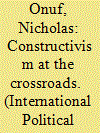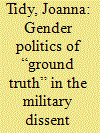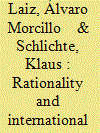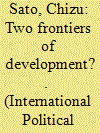|
|
|
Sort Order |
|
|
|
Items / Page
|
|
|
|
|
|
|
| Srl | Item |
| 1 |
ID:
154039


|
|
|
|
|
| Summary/Abstract |
In this paper, I ask why constructivism in IR has slowed down as a theoretical project. One answer is that slowing down is normal (as in normal science); there is no problem. I propose a second answer, to the effect that constructivism has reached a crossroads. As the way ahead gets slower and slower, the temptation to turn off the road can only strengthen. The slowdown and the crossroads point to a central feature of constructivist thinking. As constructivists, we do systematically what ordinary people do routinely—we furnish our world with moderate-sized dry goods. By now we have plenty of furniture; there must be something else we can or should be doing.
|
|
|
|
|
|
|
|
|
|
|
|
|
|
|
|
| 2 |
ID:
154038


|
|
|
|
|
| Summary/Abstract |
This article analyses the politics of “ground truth,” a premise central to the contemporary military dissent movement in the United States. Ground truth refers to the “truths” about war that soldiers who have experienced its realities can bring to bear on prevailing war narratives in order to disrupt them. The article identifies how the authority of ground truth is bound with accounts of gender and sexuality through which particular understandings of war (principally war as combat and violence) are reproduced. Examination of two prominent dissenting subject positions within the movement, the “(anti)war hero” and the “peace mom,” suggests that authority to oppose war is organized around the hegemonic military masculine figure of the warrior hero. Potentially more unruly war experiences, such as those of non-combat military personnel, remain obscured. I explore what perspectives and understandings of war might be revealed if we consider non-combat personnel as actively engaged in, and experiencing, war and discuss implications for dissent. The article therefore addresses how gendered power structures the ways in which war is known, understood, and also opposed through authenticity-based authority claims.
|
|
|
|
|
|
|
|
|
|
|
|
|
|
|
|
| 3 |
ID:
154040


|
|
|
|
|
| Summary/Abstract |
Decisions to deny asylum are often based on highly speculative credibility assessments. Language barriers, trauma, and cultural misconceptions have all been shown to impact the perceptions examiners form about cases. Yet, although contestable in principle, many negative rulings retain an aura of objectivity and are accepted as justified by the case’s lack of empirical support and legal fit. This article examines how this aura of objectivity is accomplished. How is it that the essentially contestable nature of credibility assessments gets downplayed, so that the decision to deny asylum appears to be dictated by law and evidence? To address this question, the article draws on a case encountered during ethnographic research on the work of status determination in Brazil: the decision to deny refugee status to the asylum seeker known as Mrs. Z. It is argued that maintaining the perception that there was a pivotal moment of definition is a central aspect of how the decision to deny Mrs. Z’s request came across as warranted. Talk of a pivotal moment of definition, the article shows, fosters the perception that the relevant sources of controversy “have been dealt with,” foreclosing the possibility of dissent. Drawing on the work of American ethnomethodologist Michael Lynch, I adapt the notion of “phase-work” to refer to this discursive device.
|
|
|
|
|
|
|
|
|
|
|
|
|
|
|
|
| 4 |
ID:
154042


|
|
|
|
|
| Summary/Abstract |
Rationalization, a core concept of Max Weber’s sociology, has so far largely been ignored in International Relations (IR) theory discussions, although his ideas about rationalization open new pathways for theorizing modernity and conflict. We revisit Weber’s concepts of rationalization and domination to show the limits of two key bodies of related knowledge in IR: scholarship on international organizations as bureaucracies and ideas on rationalization in the world polity approach. Rereading Weber’s approach to rationalization provides a distinct ground for our understanding of the current internationalization of rule. We illustrate the contribution our approach to rationalization makes by looking at budget support to sub-Saharan African states, and Mozambique in particular. The article concludes with a discussion of the implications that a critical rereading of Max Weber has for international politics.
|
|
|
|
|
|
|
|
|
|
|
|
|
|
|
|
| 5 |
ID:
154041


|
|
|
|
|
| Summary/Abstract |
Since the economic crisis of the past decade, public development organizations have increasingly partnered with large private corporations to empower women through business. Existing feminist analyses focus on those public-private partnerships (PPPs) that are global, agenda-setting, benchmarking, and service initiatives. However, there are door-to-door initiatives that aim to empower women at the bottom of the pyramid (BoP) by turning them into entrepreneurs in the global South. At the same time, and unconnected to these Southern initiatives, PPPs in the global North attempt to empower middle-income women to care for distant others by consuming ethically. While these two kinds of PPPs are each identified in their own literatures as new frontiers in development, thus far they have not been studied together. Using transnational feminist literacy practices as a methodology, this paper reanalyzes existing studies on PPPs in the global South and North that target women’s empowerment and have thus far been overlooked. It finds parallels and linkages between PPPs in the global South and North. The use of transnational feminist literacy practices deepens our understanding of the mechanisms by which market-led, corporate-sponsored, “smart economic” and “win-win-win” development approaches, justified in the name of women’s empowerment, obscure and/or transform structural inequalities.
|
|
|
|
|
|
|
|
|
|
|
|
|
|
|
|
|
|
|
|
|